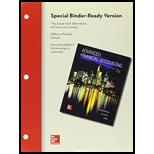
LOOSE-LEAF Advanced Financial Accounting with Connect
11th Edition
ISBN: 9781259605192
Author: Theodore E. Christensen
Publisher: McGraw-Hill Education
expand_more
expand_more
format_list_bulleted
Concept explainers
Question
Chapter 9, Problem 9.3E
To determine
Introduction:
Consolidation entries needed to prepare consolidated
To Prepare: The Worksheet consolidation entries needed to prepare the consolidated balance sheet
Expert Solution & Answer
Want to see the full answer?
Check out a sample textbook solution
Students have asked these similar questions
Financial accounting question
hello teacher please solve questions
hello teacher please answer
Chapter 9 Solutions
LOOSE-LEAF Advanced Financial Accounting with Connect
Ch. 9 - Prob. 9.1QCh. 9 - Prob. 9.2QCh. 9 - Prob. 9.3QCh. 9 - Prob. 9.4QCh. 9 - Prob. 9.5QCh. 9 - Prob. 9.6QCh. 9 - Prob. 9.7QCh. 9 - Prob. 9.8QCh. 9 - Prob. 9.9QCh. 9 - Prob. 9.10Q
Ch. 9 - Prob. 9.11QCh. 9 - Prob. 9.12QCh. 9 - Prob. 9.13QCh. 9 - Prob. 9.14QCh. 9 - Prob. 9.15QCh. 9 - Prob. 9.16QCh. 9 - Prob. 9.1CCh. 9 - Prob. 9.2CCh. 9 - Prob. 9.3CCh. 9 - Prob. 9.4CCh. 9 - Prob. 9.5CCh. 9 - Multiple-Choice Questions on Preferred Stock...Ch. 9 - Prob. 9.1.3ECh. 9 - Multiple-Choice Questions on Preferred Stock...Ch. 9 - Prob. 9.2.1ECh. 9 - Prob. 9.2.2ECh. 9 - Prob. 9.2.3ECh. 9 - Prob. 9.2.5ECh. 9 - Prob. 9.3ECh. 9 - Prob. 9.4ECh. 9 - Prob. 9.5ECh. 9 - Prob. 9.6ECh. 9 - Prob. 9.7ECh. 9 - Prob. 9.8ECh. 9 - Prob. 9.9ECh. 9 - Prob. 9.10ECh. 9 - Prob. 9.11ECh. 9 - Subsidiary Stock Dividend Lake Company reported...Ch. 9 - Prob. 9.13ECh. 9 - Prob. 9.14ECh. 9 - Prob. 9.15ECh. 9 - Prob. 9.16ECh. 9 - Multiple-Choice Questions on Preferred Stock...Ch. 9 - Prob. 9.17.2PCh. 9 - Multiple-Choice Questions on Preferred Stock...Ch. 9 - Prob. 9.17.4PCh. 9 - Prob. 9.17.5PCh. 9 - Prob. 9.18PCh. 9 - Prob. 9.19PCh. 9 - Prob. 9.20PCh. 9 - Prob. 9.21PCh. 9 - Prob. 9.22PCh. 9 - Prob. 9.23PCh. 9 - Prob. 9.24PCh. 9 - Prob. 9.25PCh. 9 - Prob. 9.26PCh. 9 - Prob. 9.27P
Knowledge Booster
Learn more about
Need a deep-dive on the concept behind this application? Look no further. Learn more about this topic, accounting and related others by exploring similar questions and additional content below.Similar questions
- Recently, Abercrombie & Fitch has been implementing a turnaround strategy since its sales had been falling for the past few years (11% decrease in 2014, 8% in 2015, and just 3% in 2016.) One part of Abercrombie's new strategy has been to abandon its logo-adorned merchandise, replacing it with a subtler look. Abercrombie wrote down $20.6 million of inventory, including logo-adorned merchandise, during the year ending January 30, 2016. Some of this inventory dated back to late 2013. The write-down was net of the amount it would be able to recover selling the inventory at a discount. The write-down is significant; Abercrombie's reported net income after this write-down was $35.6 million. Interestingly, Abercrombie excluded the inventory write-down from its non-GAAP income measures presented to investors; GAAP earnings were also included in the same report. Question: What journal entry would Abercrombie & Fitch have made to write down its merchandise inventory during the year ended…arrow_forwardHow much did riverton spend to acquire new fixed assets during 2022 ?arrow_forwardHow much income should be recognized by the employee from these transactions?arrow_forward
- Do fast of this question answer general Accountingarrow_forwardKindly help me with accounting questionsarrow_forwardXYZ Company had the following information as of Dec 31, 2019 and 2020. Selling and administrative expenses are 60% fixed and 40% variable. Required: (1) Prepare the comparative income statements of XYZ company for 2019 and 2020 using A. Variable Costing B. Absorption Costing (2) Prepare the reconciliation of the net income differences Note: Only 100% sure experts solve it correctly. Complete solutions need to get full marks. take your time, but solve fully and accurately. DO NOT USE AI GENERATED.arrow_forward
arrow_back_ios
SEE MORE QUESTIONS
arrow_forward_ios
Recommended textbooks for you
 Financial Reporting, Financial Statement Analysis...FinanceISBN:9781285190907Author:James M. Wahlen, Stephen P. Baginski, Mark BradshawPublisher:Cengage Learning
Financial Reporting, Financial Statement Analysis...FinanceISBN:9781285190907Author:James M. Wahlen, Stephen P. Baginski, Mark BradshawPublisher:Cengage Learning Cornerstones of Financial AccountingAccountingISBN:9781337690881Author:Jay Rich, Jeff JonesPublisher:Cengage Learning
Cornerstones of Financial AccountingAccountingISBN:9781337690881Author:Jay Rich, Jeff JonesPublisher:Cengage Learning

Financial Reporting, Financial Statement Analysis...
Finance
ISBN:9781285190907
Author:James M. Wahlen, Stephen P. Baginski, Mark Bradshaw
Publisher:Cengage Learning

Cornerstones of Financial Accounting
Accounting
ISBN:9781337690881
Author:Jay Rich, Jeff Jones
Publisher:Cengage Learning